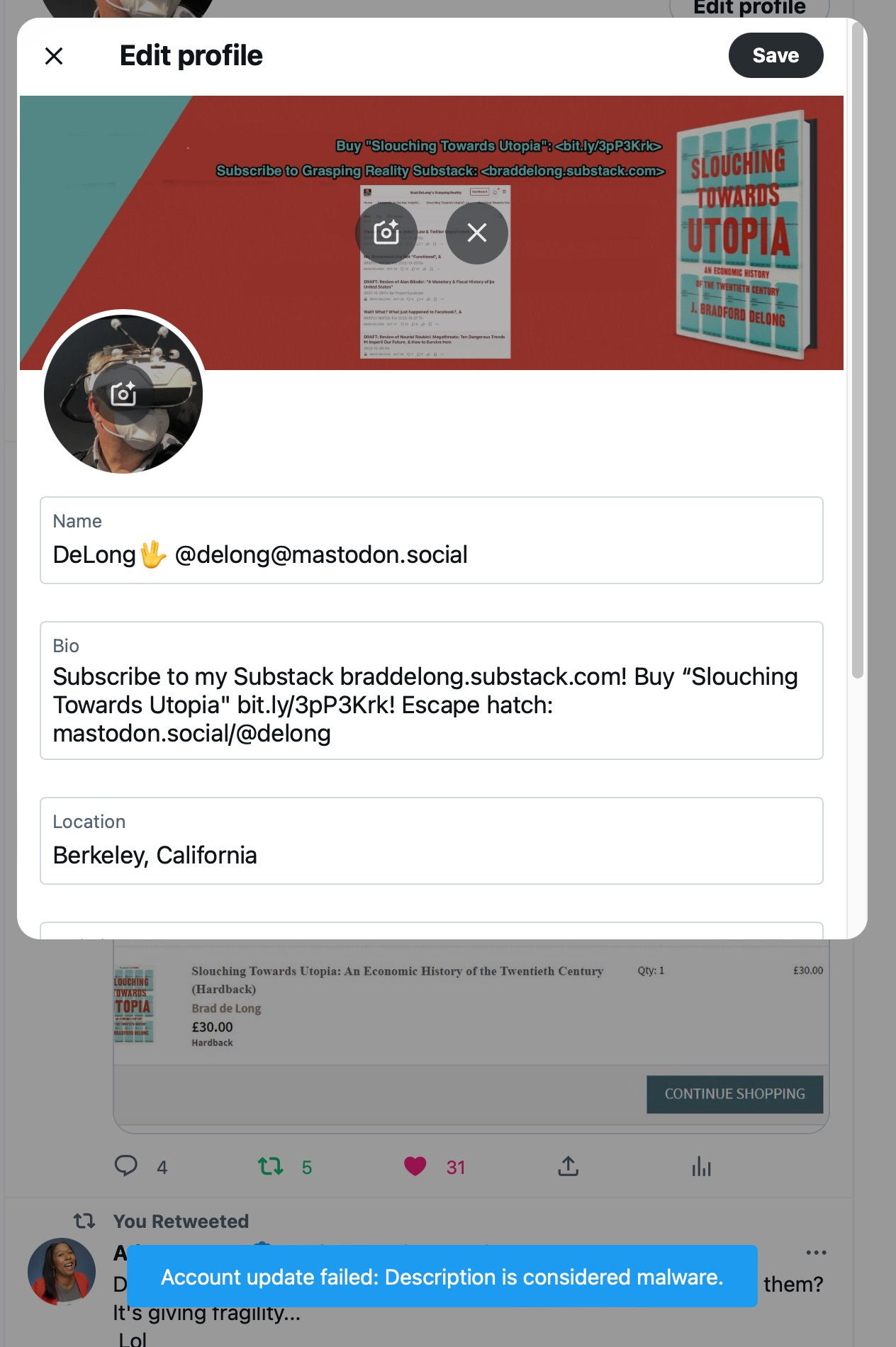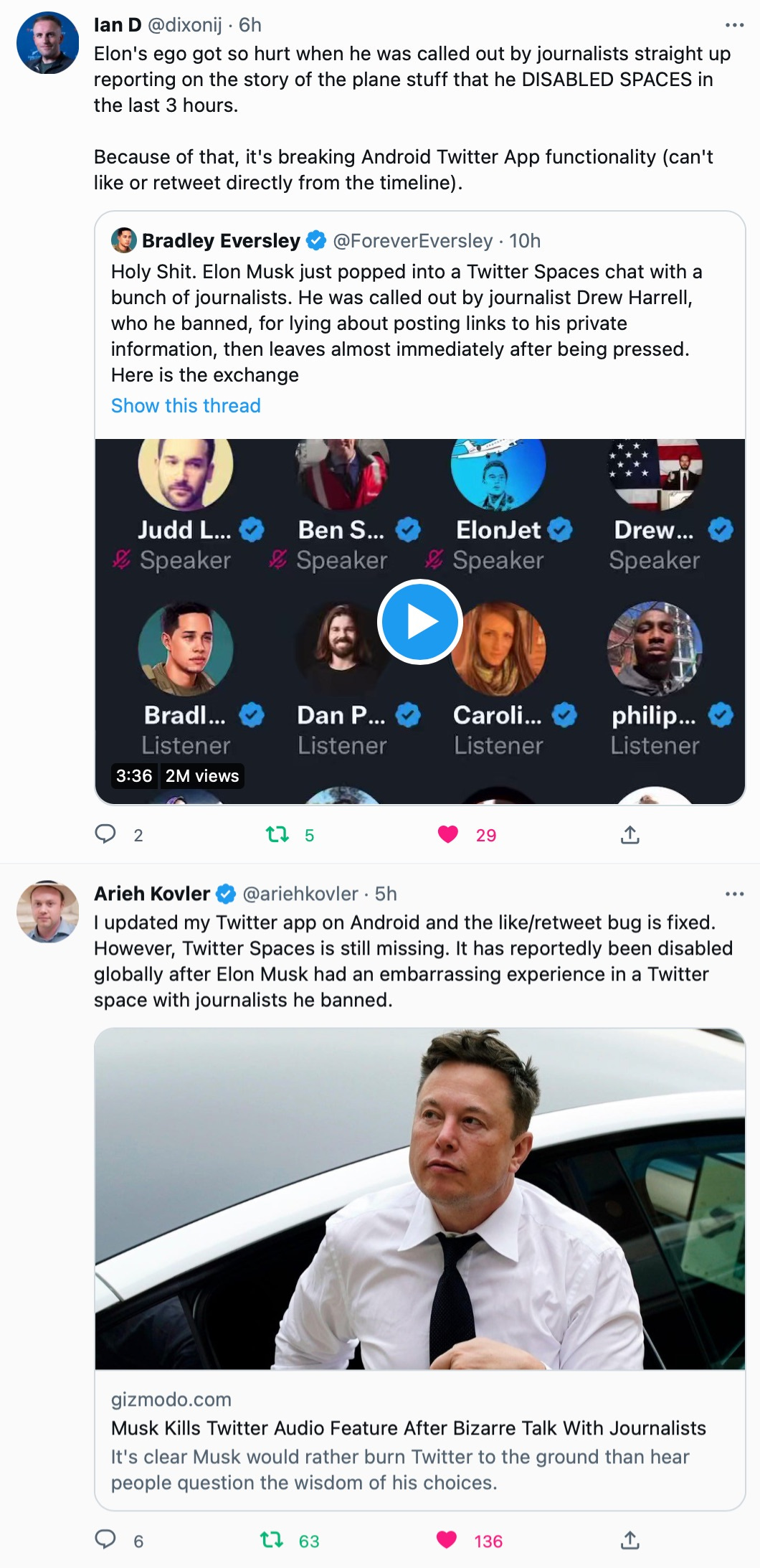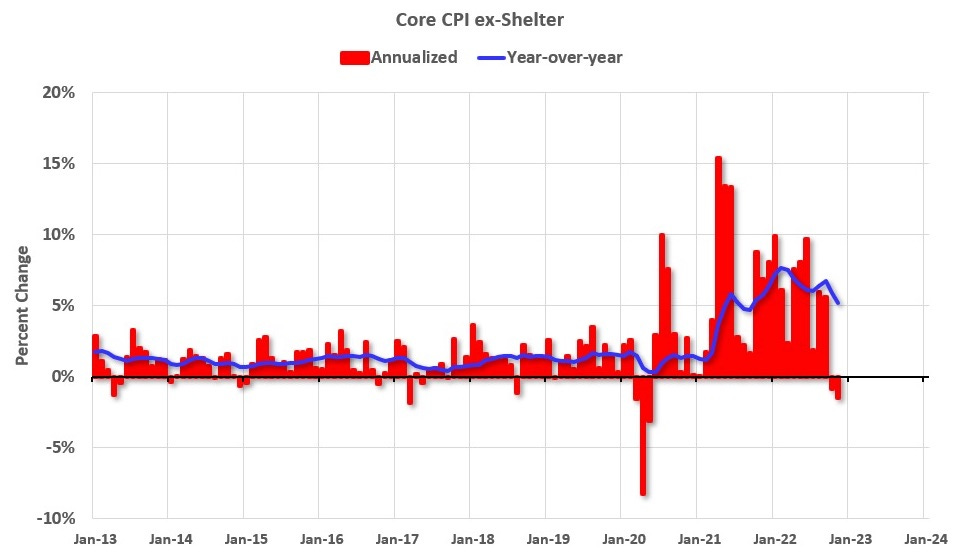CONDITION: Twitter on Fire!
You cannot put a Mastodon address in your profile. It is “considered malware”. (Do note that some programmer balked at calling it actual “malware” when ordered to do so:
And Twitter Spaces is gone:


FOCUS: MOAR Praise for Zach Carter’s Keynes Biography, The Price of Peace:
This time from Corey Robin, in the New York Review of Books:
Corey Robin: The Trouble with Money: ‘[Zach] Carter[']s Keynes belongs alongside Aristotle, Machiavelli, and Burke. Providing supple analyses of Keynes’s economic claims, Carter restores the worlds—Cambridge philosophy and morals, Bloomsbury aesthetics, and Whitehall politics—that are embedded in them. While Robert Skidelsky’s three-volume biography remains the touchstone for a full account of Keynes’s life and thought, Carter’s brings the thought to life in a way that is truer to the man. The “master-economist,” wrote Keynes, “must be mathematician, historian, statesman, philosopher,” dealing in “the temporal and the eternal, at the same time.” That is the Keynes Carter gives us...
It is really nice to see continued praise for the truly superb Price of Peace <https://www.amazon.com/dp/0525509054/>. But Corey’s review struck me as… extremely odd. Don’t get me wrong: Corey is brilliant. And, from my perspective, he is the exact kind of brilliant to attract my attention and focus—smart, knowledgeable, benevolent, and thinking very differently than I do. He is, needless to say, not an economist.
Let me try to figure out where the oddness is by trying to reflect Corey’s review in my own native idiom:
Economics—production-for-exchange, and the consequent web of exchange itself—is what binds us into a civilization, and a progressive civilization. [This seems to me to be right—but I would speak more about it as a generalization and transformation of human gift-exchange as social solidarity-generator, and of Keynes’s… warning?… the economists are the trustees not of civilization but of the possibility of civilization.]
The 20th century transformation of the word “economy” to mean not household (or public) stewardship of resources, but rather frugality, had the potential to make it all go wrong, and Keynes sought to understand how and why. [This is what I read Corey for—I would never have thought of putting it that way. But here I want to say “yes, but”. Keynes starts out his career as a huge fan of frugality in consumption balanced by liberality in investment. And he remains so throughout his life—provided, and this "provided" is very important, that technocratic adjustments are made to the economic system that euthanize the rentiers via the policy of low interest rates and insure that the balance of consumption and investment is maintained via a “somewhat comprehensive socialization of investment”.]
Keynes belongs alongside Aristotle, Machiavelli, and Burke, as well as Marx and Smith, as a moral philosopher. [Well, yes: But Keynes is much more “we have a going concern that needs technocratic adjustment”, as opposed to calling for systemic reformation and rebuilding.]
“The great set pieces of Keynesian economics are sketches of failed connection”: the failure to rebuild the Belle Époque system after WWI in 1919, the sacrifice of British prosperity on the altar of the aura sacra fames that was the gold standard in 1925, the high-unemployment equilirium of the Great Depression of the 1930s. These all arise because “knowledge of the social dimension of economic action—that we do not choose alone, that our actions have effects on others—has not yet penetrated our decisions in the market”. It is thus the job of the economist to set things up so that this social knowledge will arise. And this, when appropriate, requires throwing overboard all of economy as “economizing”: “‘We shall never be able to move again, unless we can free our limbs from these paper shackles’, Keynes writes”. [Again, yes: this is a very good way of putting it that I would not have thought of.]
“Keynes’s economics… assigns that art of public thinking not to the statesman or citizen but to the economist and to ordinary economic actors…. Keynes wanted it to shape the mind of the individual as well. Go shopping, he told the ‘patriotic housewives’ of Britain in 1931, ‘and have the added joy that you are increasing employment, adding to the wealth of the country’, and ‘bringing a chance and a hope to Lancashire, Yorkshire, and Belfast’. [Yes: Keynes wanted to do everything he could to increase the marginal propensity to consume in 1931. But the broader conclusion seems to me to miss the mark: Keynes definitely did not believe in full employment, equilibrium, attained by bottom up mass movement and collective solidarity; it was the central bank that had to create the low interest-rate policy, and it was the government that had to achieve the "somewhat comprehensive socialization of investment”.]
“Keynes [also] worried about… how we overconnect… outsourcing our judgments…. The result is a perverse sort of beauty contest in which none of us chooses our favorite contestant but the one we think others are likely to choose. Instead of the equilibrium of self and other that is Smith’s communion of needs, Keynes writes, ‘we have reached the third degree where we devote our intelligences to anticipating what average opinion expects the average opinion to be. And there are some, I believe, who practice the fourth, fifth and higher degrees.’… This was the world that Smith, under the influence of Rousseau, feared the market would reproduce. Rousseau believed that a fateful turn in human development occurred when we gathered in front of huts and under trees to perform for one another.” [Here I think Corey has gone off the rails: Keynes’s insights into human psychology, our inability to pierce the veil of time and ignorance, and the madness of crowds in the stock market and in booms and bubbles more generally are his own. Thet have next to nothing to do with Rousseau's discourses on natural goodness, healthy civilizational virtue, and corruption by luxury and performance.]
“Increase in temporal distance and the introduction of the far-off future as a factor in our calculations [means] money becomes a more potent concern. A monetary economy is not simply an economy in which money is a factor of exchange…. Because we have little certainty about what the future will bring, we fall back on… a socially approved way of thinking about the future…. Many economic decisions in a monetary economy press us to cede our personal judgments and allow others to do the judging for us…. At certain moments, particularly of crisis or change, the uncertainty of the future is revealed and the flimsiness of these conventions is exposed. The quiet precarity of our judgment gives way to a roaring river of anxiety…. This analysis of the toxic synergy between money and time is easily the most influential and familiar of Keynes’s arguments.” [And now he is back on track.]
I am goinbg to ahve to think hard about this: Is Corey making connections that had escaped me? Or is he going down false trails because he does not construct the proper sub-Turing instantiation of a two-thirds economist and one-third philosopher John Maynard Keynes to then run in a separate partition on his own wetware?
MUST-READ: Since San Francisco Bay Turned Against Building:
Justin Fox: What Happened When the Bay Area Rejected Growth: ‘“Not in my backyard” may be giving way to yes: From 1940 to 1960, the population of the nine counties surrounding the San Francisco Bay more than doubled to 3.6 million. In a 1959 report, the US Commerce Department’s Office of Area Development projected that it would double again by 1990, and yet again by 2020, when the region was expected to house 14.4 million people. That’s not what happened. As of the April 2020 US Census, the population of the nine counties was 7.8 million…
ONE VIDEO: Barbie!
ONE IMAGE: Core CPI ex-Shelter:
Oþer Things Þt Went Whizzing by…
Very Briefly Noted:
Peter Orszag: Central banks should beware the dangers of over-tightening: ‘Sometimes the best course of action is to wait and see… 100% correct…
Beth Kowitt: The GOP Is Playing Chicken With Trillions in Assets: A new Senate Republican report gives us a look inside the party’s playbook for punishing asset managers and their “liberal social goals”: ‘In the clearest sign yet that a contingent of the Republican Party plans to make its attack on “woke” corporations a core tenet of its platform, look no further than its latest target: asset managers… Now complete is the transformation of the American Republican Party from, as Dean Acheson put it in the 1950s, the party of the economic future—the party of those who have something to gain from business and growth—to the party of the economic past, of those who have something to lose and fear change…
Ian Buruma: Was Trump or Brexit the Bigger Mistake? The Answer Is Clear: ‘As Americans and Britons are discovering, nations can recover from bad elections far more easily than from bad referendums. The US is moving on… This seems to me to be much more of a hhopeelp than an analysis. Certainly Ron DeSantis and the entire Republican Party—both the DeSantis wing and the Trump wing—are betting that America is not moving on….
David Dayen: The Easiest Criminal Indictment Ever: ‘The rapid arrest of Sam Bankman-Fried offers a small bit of hope that we’ve turned the page on an era of no accountability…
Ray Lombardi: Record lows on the Mississippi: How climate change is altering large rivers…
¶s:
Over the past two decades, we finally got near consensus among non-Republican Neanderthals that immigrants are a source of strength for America. Yet the Republican Party controls too many veto points, and is completely in "pull up the ladder” mode.:
Bloomberg Editors: The US Can’t Afford to Lose Skilled Immigrants: Requiring laid-off H-1B visa holders to leave the country is both cruel and self-defeating: ‘Meta let 11,000 workers go — and immigrants are now racing the clock. A wave of layoffs at US technology companies has forced scores of skilled immigrants on temporary visas to find new jobs within 60 days or leave the country. Their predicament underscores how a flawed system is jeopardizing America’s ability to attract and retain the foreign-born talent it needs…. Of the estimated 580,000 current H-1B holders, more than half have had an employer petition for them to get a green card. Due to the system’s arbitrariness and inefficiency, however, the process for actually obtaining one lasts years; many immigrants from India — which contributes the largest share of applicants — can expect to wait for decades…
Bill McBride: Housing, Inflation and Why the Fed Should Consider a Pause: ‘It appears the Fed is missing the recent sharp slowdown in household formation…. This “dramatic shift” in household formation is leading to Rents Falling Faster than "Seasonality Alone". Since rents are falling - and will likely continue to fall - it probably makes sense to look at inflation ex-shelter for monetary policy over the next several months…. Core CPI ex-Shelter (blue), and the one month change annualized (red). The year-over-year change was at 5.2% in November…. Core CPI ex-shelter fell at 1.5% annual rate in November… My view is inflation will ease quicker than the Fed currently expects and a pause in rate hikes should be considered…
IMHO, the right line to take with Beijing is: Absorbing Taiwan would have been impossible two generations ago. It would be touch-and-go now. It will be very easily two generations hence—if, in fact, the world is going your way. And if the world is not going your way, trying to absorb Taiwan right now would give you additional problems when you cannot handle the ones you already have:
Jason Hsu: What the World’s Most Important Company Must Do | by Jason Hsu: With the outlook for Sino-American relations remaining grim, the globally indispensable Taiwan Semiconductor Manufacturing Company (TSMC) is quietly exploring its options. Stuck in the middle of the twenty-first century’s great-power contest, its future will depend on playing a smart long game: ‘Often referred to as the “Silicon Shield,” Taiwan produces a staggering 65% of the world’s semiconductors and over 90% of the highest-end chips. As such, no company is more singularly important to the global economy than TSMC…. China’s dependence on Taiwanese chips has served as a form of deterrence and protection for Taiwan, because the Chinese government simply cannot seize the island’s highly sensitive chip-manufacturing facilities by force. While some observers worry that China may regard TSMC as a reason in itself to take Taiwan, TSMC chair Mark Liu has pointed out that a war would inevitably destroy TSMC’s fabs or render them inoperable. Still, TSMC finds itself caught in the middle of a great-power competition…. China will almost certainly fall behind in the semiconductor race, because it lacks access to the lithography machines needed to manufacture the most advanced chips. Nonetheless, it is likely to dominate the market in legacy chips (those ranging from 28 to 44 nanometers)…. TSMC’s goal remains the same: to maintain its status as the unrivaled industry leader. To do so, it will have to play a smart long game. That means making necessary sacrifices in its Chinese business, pacing itself with new investments and diversification overseas, and ultimately keeping its most advanced chips in Taiwan…. Ensuring that Taiwan’s economy, trade, and technology supply chains are resilient and less dependent on China is in America’s vital interest. Caught in the middle of the twenty-first century’s great-power competition, TSMC can only hope that US leaders continue to recognize this…
SNORT!:
Heather Burke: FTX Fallout: ‘A GitHub account bearing the name of former FTX executive Nishad Singh authored code that hid Alameda Research’s ballooning liabilities on the now-collapsed cryptocurrency exchange, according to internal documentation reviewed by Bloomberg News. FTX executive Ryan Salame told Bahamian regulators on Nov. 9 that client assets were transferred to Alameda to “cover financial losses” at the trading firm, court filings show. The grim conditions FTX founder Sam Bankman-Fried is encountering in the Bahamas prison where he’s currently being held could change his attitude on extradition to face fraud charges in the US…
The latest bunch of no-more-Trumpers will, of course, turn and run back to Trump as soon as he looks like he might be a winner:
Bill Lueders: You’re Only Leaving Trump Now?: The ex-president’s former allies are coming up with reasons to reject him, as though these weren’t always obvious and abundant: ‘Marc Thiessen has had enough…. Really? What has Trump done?… (It’s not completely clear which election Thiessen is referring to that caused something to snap. The one more than two years ago? The one on November 8? Take your pick.) After praising Trump’s great achievement in “his remaking of the American judiciary with the appointment of three outstanding Supreme Court justices and hundreds of lower court judges,” Thiessen lamented that Trump has now gone and spoiled it all by saying something stupid. “But now,” he wrote, “with just a few bizarre social media posts, Trump has repudiated that entire legacy.” Really? Thiessen explained that he is referring to Trump’s denunciations of the Supreme Court when it refused to block the release of his tax returns. The court, Trump wrote on Truth Social, “has lost its honor, prestige, and standing, & has become nothing more than a political body, with our Country paying the price.” Thiessen’s bone to pick is that this sounds like something Chuck Schumer or Nancy Pelosi might say, in criticizing the court that Trump picked a third of…. Thiessen… conten[ds]… that Trump, in lambasting the court and then, in a separate post, calling for the “termination” of parts of the Constitution, had crossed a new line…. Thiessen’s indictment… said the reasons for dumping Trump go beyond his sudden declarations of contempt for the judiciary and the Constitution and the rule of law. There’s also the fact that Trump “has descended into a spiral of conspiracy theories and personal grievances. He has surrounded himself with the political dregs.” Really? This is new?… Are we to believe there is something remarkable or different about Trump’s embrace of the politics of personal grievance, after he yanked the security clearance of former CIA director John Brennan as punishment for his critical comments, denied House Speaker Nancy Pelosi the use of a military jet to visit U.S. troops in Afghanistan, threatened to withhold pandemic assistance to electoral battleground states that moved to expand mail-in voting to mitigate the pandemic, or called for government crackdowns on social media companies that offended him? As for surrounding himself with “the political dregs,” just who exactly was surrounding Trump before? Paragons of virtue like Steve Bannon, Stephen Miller, Sebastian Gorka, Michael Flynn, Paul Manafort, Roger Stone, and Rudy Giuliani? It is just not possible to go downhill from there…. There is only one reason among all of the many cited by Thiessen that Republicans are turning away from Donald Trump now: because he cannot win. Everything else they were perfectly willing to put up with, and they would put up with it again—if only they believed that he stood a chance of helping keep them in power…










To note a rare recurrent error of our host: the Republicans as "the party of the economic past, of those who have something to lose and fear change". No. They are the party of masculinism, racism, and ressentiment. They want to ensure that Others lose more than they do, and don't care about what they lose in the process. They welcome transformative loss and destruction, not stasis.
In re: J M Keynes
'The 20th century transformation of the word “economy” to mean not household (or public) stewardship of resources, but rather frugality...'
Ahem. In Marlowe's Faust, Dr Faustus says, 'Bid Onkaymeon [sp?] farewell,' referring the Greek 'On kai me on', meaning 'being and not being': the kind of thing that philosophers have worried over from the earliest times. An early edition (the first, I think) corrected this to the simple and understandable and wrong 'Bid Economy farewell'. Or so I have read. I pondered this for a time till I realized that Economy here meant Frugality, to which Faustus could bid farewell now that he had Mephistopheles working for him. Hence, not just a 20th century corruption.
[All of this subject to correction by those who know literary history better than I.]